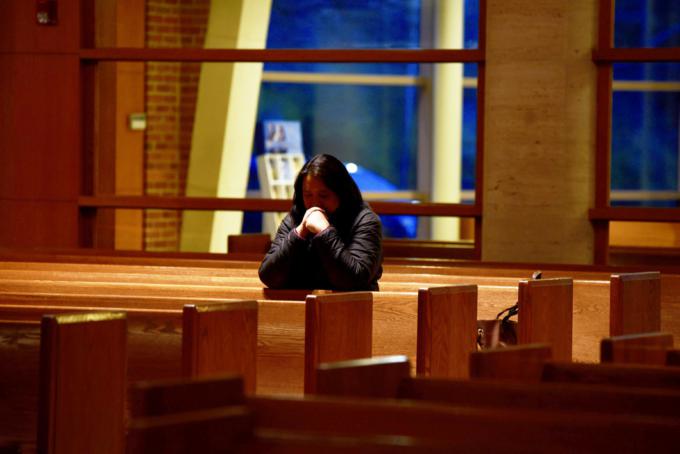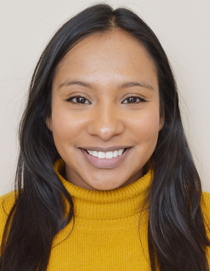
Culture
Several years ago, my spiritual director encouraged me to befriend fear. My fear increases as the uncertainties in my life increase.

Olea
As we watched the COVID-19 pandemic multiply throughout the country, I saw my Facebook account explode with an overwhelming amount of emotions, information and misinformation. I'm sure you saw it, too.
Without even thinking twice about it, I deleted the Facebook app off my cellphone. I recognized in me an unsettling feeling surfing back up. Panic. Fear. Uncertainty.
As an immigrant, I've spent years trying to cope with these emotions and I know when to walk away. I know to recognize when I need to seek rest and comfort from my Lord.
Several years ago, my spiritual director encouraged me to befriend fear. My fear increases as the uncertainties in my life increase.
For the past 12 years, those of us in the Deferred Action for Childhood Arrivals program know how this cycle goes. Every year or two -- caught in the middle of political chaos and treated like pawns -- we submit a renewal application and wait it out.
Similarly, undocumented immigrants not in DACA know how fear and panic can overwhelm your physical body. This feeling arises every time we hear about another U.S. Immigration and Customs Enforcement raid or random traffic checks.
For many who live on these peripheries, learning to cope with emotions isn't just about survival, it's how we've built our resilience in overcoming daily hardships. Unexpectedly, we are emotionally trained to deal with crises like the current pandemic.
Today, thousands across America are getting a glimpse into our lifestyles. Perhaps our quarantine isn't as restricted, but every undocumented immigrant knows what it's like to have to voluntarily self-quarantine for an unspecified amount of time. All too well, we understand what it's like to limit our exposure and live in the shadows.
I don't want to undermine the severity of COVID-19. It's guaranteed to make vulnerable populations even more vulnerable. But I want to direct your attention to the community that has been living in quarantine for years, literally frightened to walk outside, go to work or attend Mass.
Our undocumented community will face even more barriers due to the current health pandemic. First, many lack health insurance. Consequently, they will be very hesitant in seeking medical attention if needed. Many will avoid being tested for the virus out of fear.
On March 19, the Senate passed a COVID-19 relief bill, designed to aid Americans. Though the logistics are still being worked out, it's very likely undocumented immigrants will not qualify for assistance.
If they do, many will choose not to take the assistance because of the so-called "public charge" rule, effective Feb. 24, that disqualifies immigrants who accept public assistance from citizenship status on grounds of inadmissibility for fear they could become a public charge in the future.
These consequences have been laying heavy on my heart.
I'm offering up my quarantine and sacrifices for those who will go through this season with no physical support system. I'm offering up these long and dreary days for my brothers and sisters who will continue to live in quarantine long after COVID-19. I'm offering up my social distancing for the children of the undocumented community, who face such adversity at a young age and are robbed of childhood innocence.
Over the years, I did learn to befriend fear. I try to practice accepting and recognizing grace in all moments, even in suffering. Fear has allowed me to encounter God's abundant love and unbounding mercy.
I want to invite you to give an offering of hope to those who are forgotten in this Lenten season. While the details of the COVID-19 relief package have not yet been finalized as of March 19, it may be the case that some who will receive monetary aid might not need the extra income.
Consider sharing this gift with your immigrant neighbors who will go without any protection measurements. Find a family, a local immigration service nonprofit or a Dreamer student who's dreaming about college in the fall. They might be forgotten by the system, but we can choose to share God's mercy and grace with them.
- Edith Avila Olea is associate director of justice and peace for the Diocese of Joliet, Illinois. The 2015 winner of the Cardinal Bernardin New Leadership Award, she holds a master's degree in public policy and a bachelor's degree in organizational communication.
Recent articles in the Culture & Events section
-
'Dignitas' and the mediaRussell Shaw
-
Scripture Reflection for April 14, 2024, Third Sunday of EasterDeacon Greg Kandra
-
St. Helena's House is established in the South EndThomas Lester
-
Is this synodality?Russell Shaw
-
Poking the hornet's nest of IVFFather Tadeusz Pacholczyk


















